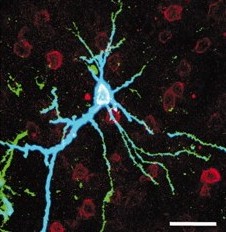Long-term memory is a slippery thing. Just how slippery it can be was demonstrated a few years ago by Weizmann Institute scientists, who
erased entire memories in rats just by blocking a certain protein in the brain. In other words, memory – even the part we imagine to contain neatly packed files – is in reality a dynamic piece of equipment that must be actively maintained to work. Now, in research published in
Science, these scientists have shown that
manipulating the same protein can enhance memory.
The protein – PKMzeta – is produced in the brain in response to learning, and it acts on the synapses – the active contact points between neurons. It continues to operate there long after the memory has been formed, suggesting that its function is tied not to learning (that is, absorbing information), but to keeping what is learned available in the long-term memory. In 2007,
Prof. Yadin Dudai and research student Reut Shema of the Neurobiology Department, together with Prof. Todd Sacktor of SUNY Downstate Medical Center, New York, trained rats to avoid a specific taste and then blocked the activity of PKMzeta in their brains. While the control rats still had a strong aversion to the taste, even months after the training, those in which the activity of the protein was briefly blocked had no such qualms, appearing to have forgotten what they had learned.
But, could extra doses of PKMzeta actually improve memory? Investigating this claim turned out to be a more difficult prospect than blocking protein activity. Simply injecting the protein into the rats’ grey matter was not an option, as the brain is built to keep such extraneous material from reaching the neurons. So Dudai, Shema and Sacktor teamed up with
Dr. Alon Chen and Sharon Haramati, also of the Neurobiology Department, to create harmless viruses that carry extra copies of the PKMzeta gene into the brain cells’ nucleus, tricking the neurons themselves into producing greater quantities of the protein.
Once again, they trained the rats to avoid the taste. Weeks after the training, the rats whose brains were churning out more of the proteins were much more likely to avoid the taste. In other words, an excess of PKMzeta effectively enhanced their memories. This is the very first demonstration that memories formed long ago can be augmented by manipulating a component of the memory machinery in the brain.
While the technique they developed is only suitable for the lab, the researchers hope that by shedding light on the function of this key component of the memory machinery, their findings might eventually point to ways of preventing or treating memory loss. Shema: “Our research is evidence that our brains are very plastic – even our long-term memories can be augmented.”
Prof. Yadin Dudai’s research is supported by the Nella and Leon Benoziyo Center for Neurological Diseases; the Abe and Kathryn Selsky Memorial Research Project; Miel de Botton Aynsley, UK; Dr. Henry Kaminer, New York, NY; Marla L. Schaefer, New York, NY; and Lisa Mierins Smith, Canada. Prof. Dudai is the incumbent of the Sara and Michael Sela Professorial Chair of Neurobiology.
